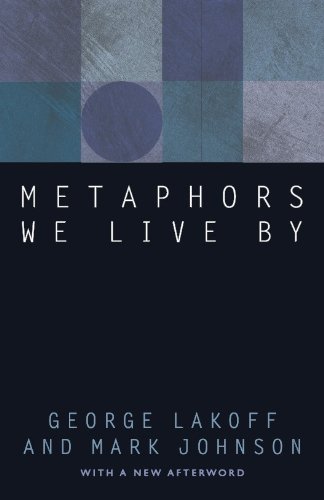What do you think?
Rate this book


223 pages, Kindle Edition
First published January 1, 1980
We have seen in our discussion of grounding that there are directly emergent concepts (like up-down, in-out, object, substance, etc) and emergent metaphorical concepts based on our experience (like 'the visual field is a container', 'an activity is a container', etc). From the limited range of examples we have considered, it might seem as if there were a clear distinction between directly emergent and metaphorically emergent concepts and that every concept must be one of the the other. This is not the case. Even a concept as basic as causation is not purely emergent or purely metaphorical. Rather, it appears to have a directly emergent core that is elaborated metaphorically.
Many of our activities (arguing, solving problems, budgeting time, etc) are metaphorical in nature. The metaphorical concepts that characterise these activities structure our present reality. New metaphors have the power to create a new reality. This can begin to happen when we start to comprehend our experience in terms of a metaphor, and it becomes a deeper reality when we begin to act in terms of it. If a new metaphor enters the conceptual system that we base our actions on, it will alter the conceptual system and the perceptions and actions that the system gives rise to. Much of cultural change arises from the introduction of new metaphorical concepts and the loss of old ones. For example, the Westernisation of cultural throughout the world is partly a matter of introducing the 'time is money' metaphor into those cultures.
1. Understanding a sentence as being true in a given situation requires having an understanding of the sentence and having an understanding of the situation.
2. We understand a sentence as being true when our understanding of the sentence fits our understanding of the situation closely enough.
The idea that metaphors can create realities goes against most traditional views of metaphor. The reason is that metaphor has traditionally been viewed as a matter of mere language rather than primarily as a means of structuring our conceputal system and the kinds of everyday activities we perform. It is reasonable enough ot assume that words alone don't change reality. But changes in our conceptual system do change what is real for us and affect how we perceive the world and act upon those perceptions.